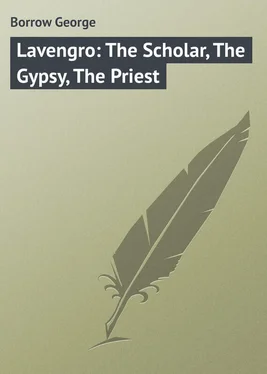George Borrow - Lavengro - The Scholar, The Gypsy, The Priest
Здесь есть возможность читать онлайн «George Borrow - Lavengro - The Scholar, The Gypsy, The Priest» — ознакомительный отрывок электронной книги совершенно бесплатно, а после прочтения отрывка купить полную версию. В некоторых случаях можно слушать аудио, скачать через торрент в формате fb2 и присутствует краткое содержание. Жанр: foreign_prose, на английском языке. Описание произведения, (предисловие) а так же отзывы посетителей доступны на портале библиотеки ЛибКат.
- Название:Lavengro: The Scholar, The Gypsy, The Priest
- Автор:
- Жанр:
- Год:неизвестен
- ISBN:нет данных
- Рейтинг книги:5 / 5. Голосов: 1
-
Избранное:Добавить в избранное
- Отзывы:
-
Ваша оценка:
- 100
- 1
- 2
- 3
- 4
- 5
Lavengro: The Scholar, The Gypsy, The Priest: краткое содержание, описание и аннотация
Предлагаем к чтению аннотацию, описание, краткое содержание или предисловие (зависит от того, что написал сам автор книги «Lavengro: The Scholar, The Gypsy, The Priest»). Если вы не нашли необходимую информацию о книге — напишите в комментариях, мы постараемся отыскать её.
Lavengro: The Scholar, The Gypsy, The Priest — читать онлайн ознакомительный отрывок
Ниже представлен текст книги, разбитый по страницам. Система сохранения места последней прочитанной страницы, позволяет с удобством читать онлайн бесплатно книгу «Lavengro: The Scholar, The Gypsy, The Priest», без необходимости каждый раз заново искать на чём Вы остановились. Поставьте закладку, и сможете в любой момент перейти на страницу, на которой закончили чтение.
Интервал:
Закладка:
‘What ails you, my child?’ said a mother to her son, as he lay on a couch under the influence of the dreadful one; ‘what ails you? you seem afraid!’
Boy . And so I am; a dreadful fear is upon me.
Mother . But of what? There is no one can harm you; of what are you apprehensive?
Boy . Of nothing that I can express; I know not what I am afraid of, but afraid I am.
Mother . Perhaps you see sights and visions; I knew a lady once who was continually thinking that she saw an armed man threaten her, but it was only an imagination, a phantom of the brain.
Boy . No armed man threatens me; and ’tis not a thing like that would cause me any fear. Did an armed man threaten me, I would get up and fight him; weak as I am, I would wish for nothing better, for then, perhaps, I should lose this fear; mine is a dread of I know not what, and there the horror lies.
Mother . Your forehead is cool, and your speech collected. Do you know where you are?
Boy . I know where I am, and I see things just as they are; you are beside me, and upon the table there is a book which was written by a Florentine; all this I see, and that there is no ground for being afraid. I am, moreover, quite cool, and feel no pain – but, but —
And then there was a burst of ‘gemiti, sospiri ed alti guai.’ Alas, alas, poor child of clay! as the sparks fly upward, so wast thou born to sorrow – Onward!
CHAPTER NINETEEN
AGREEABLE DELUSIONS – YOUTH – A PROFESSION – AB GWILYM – GLORIOUS ENGLISH LAW – THERE THEY PASS – MY DEAR OLD MASTER – THE DEAL DESK – LANGUAGE OF THE TENTS – WHERE IS MORFYDD? – GO TO – ONLY ONCE
It has been said by this or that writer, I scarcely know by whom, that, in proportion as we grow old, and our time becomes short, the swifter does it pass, until at last, as we approach the borders of the grave, it assumes all the speed and impetuosity of a river about to precipitate itself into an abyss; this is doubtless the case, provided we can carry to the grave those pleasant thoughts and delusions, which alone render life agreeable, and to which even to the very last we would gladly cling; but what becomes of the swiftness of time, when the mind sees the vanity of human pursuits? which is sure to be the case when its fondest, dearest hopes have been blighted at the very moment when the harvest was deemed secure. What becomes from that moment, I repeat, of the shortness of time? I put not the question to those who have never known that trial, they are satisfied with themselves and all around them, with what they have done, and yet hope to do; some carry their delusions with them to the borders of the grave, ay, to the very moment when they fall into it; a beautiful golden cloud surrounds them to the last, and such talk of the shortness of time: through the medium of that cloud the world has ever been a pleasant world to them; their only regret is that they are so soon to quit it; but oh, ye dear deluded hearts, it is not every one who is so fortunate!
To the generality of mankind there is no period like youth. The generality are far from fortunate; but the period of youth, even to the least so, offers moments of considerable happiness, for they are not only disposed but able to enjoy most things within their reach. With what trifles at that period are we content; the things from which in after-life we should turn away in disdain please us then, for we are in the midst of a golden cloud, and everything seems decked with a golden hue. Never during any portion of my life did time flow on more speedily than during the two or three years immediately succeeding the period to which we arrived in the preceding chapter: since then it has flagged often enough; sometimes it has seemed to stand entirely still; and the reader may easily judge how it fares at the present, from the circumstance of my taking pen in hand, and endeavouring to write down the passages of my life – a last resource with most people. But at the period to which I allude I was just, as I may say, entering upon life; I had adopted a profession, and, to keep up my character, simultaneously with that profession – the study of a new language. I speedily became a proficient in the one, but ever remained a novice in the other: a novice in the law, but a perfect master in the Welsh tongue.
Yes; very pleasant times were those, when within the womb of a lofty deal desk, behind which I sat for some eight hours every day, transcribing (when I imagined eyes were upon me) documents of every description in every possible hand, Blackstone kept company with Ab Gwilym – the polished English lawyer of the last century, who wrote long and prosy chapters on the rights of things – with a certain wild Welshman, who some four hundred years before that time indited immortal cowydds and odes to the wives of Cambrian chieftains – more particularly to one Morfydd, the wife of a certain hunchbacked dignitary called by the poet facetiously Bwa Bach – generally terminating with the modest request of a little private parlance beneath the greenwood bough, with no other witness than the eos, or nightingale, a request which, if the poet himself may be believed, rather a doubtful point, was seldom, very seldom, denied. And by what strange chance had Ab Gwilym and Blackstone, two personages so exceedingly different, been thus brought together? From what the reader already knows of me, he may be quite prepared to find me reading the former; but what could have induced me to take up Blackstone, or rather the law?
I have ever loved to be as explicit as possible; on which account, perhaps, I never attained to any proficiency in the law, the essence of which is said to be ambiguity; most questions may be answered in a few words, and this among the rest, though connected with the law. My parents deemed it necessary that I should adopt some profession, they named the law; the law was as agreeable to me as any other profession within my reach, so I adopted the law, and the consequence was, that Blackstone, probably for the first time, found himself in company with Ab Gwilym. By adopting the law I had not ceased to be Lavengro.
So I sat behind a desk many hours in the day, ostensibly engaged in transcribing documents of various kinds; the scene of my labours was a strange old house, occupying one side of a long and narrow court, into which, however, the greater number of the windows looked not, but into an extensive garden, filled with fruit trees, in the rear of a large, handsome house, belonging to a highly respectable gentleman, who, moyennant un douceur considerable, had consented to instruct my father’s youngest son in the mysteries of glorious English law. Ah! would that I could describe the good gentleman in the manner which he deserves; he has long since sunk to his place in a respectable vault, in the aisle of a very respectable church, whilst an exceedingly respectable marble slab against the neighbouring wall tells on a Sunday some eye wandering from its prayer-book that his dust lies below; to secure such respectabilities in death, he passed a most respectable life. Let no one sneer, he accomplished much; his life was peaceful, so was his death. Are these trifles? I wish I could describe him, for I loved the man, and with reason, for he was ever kind to me, to whom kindness has not always been shown; and he was, moreover, a choice specimen of a class which no longer exists – a gentleman lawyer of the old school. I would fain describe him, but figures with which he has nought to do press forward and keep him from my mind’s eye; there they pass, Spaniard and Moor, Gypsy, Turk, and livid Jew. But who is that? what that thick pursy man in the loose, snuff-coloured greatcoat, with the white stockings, drab breeches, and silver buckles on his shoes; that man with the bull neck, and singular head, immense in the lower part, especially about the jaws, but tapering upward like a pear; the man with the bushy brows, small grey eyes replete with catlike expression, whose grizzled hair is cut close, and whose ear-lobes are pierced with small golden rings? Oh! that is not my dear old master, but a widely different personage. Bon jour, Monsieur Vidocq! expressions de ma part à Monsieur Le Baron Taylor. But here he comes at last, my veritable old master!
Читать дальшеИнтервал:
Закладка:
Похожие книги на «Lavengro: The Scholar, The Gypsy, The Priest»
Представляем Вашему вниманию похожие книги на «Lavengro: The Scholar, The Gypsy, The Priest» списком для выбора. Мы отобрали схожую по названию и смыслу литературу в надежде предоставить читателям больше вариантов отыскать новые, интересные, ещё непрочитанные произведения.
Обсуждение, отзывы о книге «Lavengro: The Scholar, The Gypsy, The Priest» и просто собственные мнения читателей. Оставьте ваши комментарии, напишите, что Вы думаете о произведении, его смысле или главных героях. Укажите что конкретно понравилось, а что нет, и почему Вы так считаете.












